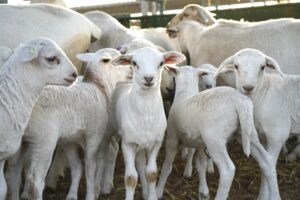Saudi Arabia, the world’s largest importer of sheep, and its similar food import-dependent neighbor, the UAE, are taking charge of investments in innovative, homegrown food technologies in hopes of making the Gulf states and the wider MENA region self-sufficient and independent of imports from the likes of Australia and New Zealand.
New Zealand has completed its last livestock exports by sea. It ceased the operation as of mid-April as the country fully implemented a ban on export shipments of animals on the grounds of their welfare.
The government announced in 2021 that shipping animals offshore, mainly for building herds in trading partners like China, would be halted and farmers would be given two years to transition out of the profitable export business. It followed a review of live exports after the capsizing of a ship bound for China that killed nearly 6,000 cows and 41 of the 43 crew members.
Similarly, Australia has also begun phasing out live sheep exports. Only 575,000 sheep were exported live from Australia in 2021 globally, compared to two million in 2017.
They, too, have cited animal welfare concerns.
These sheep are typically loaded onto livestock ships departing from Western Australia to supply the Gulf markets. The voyage can last up to three weeks. Despite the ban on transporting animals during summer, it remains challenging.
In 2017, approximately 2,400 sheep died onboard a livestock ship traveling from Fremantle to the Middle East, primarily due to heat stress.
The bans will heavily affect parts of the GCC, which heavily rely on sheep exports.
According to a 2021 TrendEconomy report, the largest sheep importer was Saudi Arabia, with 29 percent of world imports ($494 million), followed by Oman, with 16.3 percent ($278 million), Jordan at 12 percent ($203 million), and Qatar with 6.93 percent ($117 million) of all global sheep imports.
Creating viable homegrown alternatives
Amine Ben, the COO of Verticroft Holdings, which owns and operates the UAE’s largest sustainable sheep farm, told Al Arabiya English that the changes in international practice require more homegrown solutions across the GCC to make up the shortfall.
“In this region, traditional farming practices face challenges due to limited resources and arid conditions, making food security a top priority. Over 80 percent of the region’s food supply is currently imported from overseas, and as a result, governments are making a significant effort to establish sustainable and locally produced alternatives,” Ben told Al Arabiya English.
“The recent planned phase-out of live animal exports in Australia and New Zealand has further underscored the urgency of creating viable homegrown alternatives that can match or even surpass the quality of imported goods.”
The Verticroft flock of fast-growing Australian White sheep has increased in numbers to more than 1,500 since the animals were first flown in on a Singapore Airlines plane in 2020.
Due to its early success, Verticroft Holdings is moving its operations from Dubai to a massive farm in Abu Dhabi with the capacity to rear 7,000 sheep sustainably.
According to Ben, “In the event that the ban on live sheep exports goes through and is finalized, this region will face challenges in terms of its live animal requirements, as air transport of live animals is prohibitively expensive, and large quantities of high-quality sheep are not readily available for export from surrounding nations.”

“Nonetheless, we have demonstrated that it is feasible to sustainably and ethically raise world-class, high-quality lamb in this region, provided the correct breed, farming practices, and feed solutions are employed.”
Ben said the goal is not to replace all imports overnight, adding, this would be a “monumental task.”
However, they believe that “through dedication, investment, and technology, it is possible to raise quality lamb in this region sustainably and ethically.”
Ben said that raising livestock in arid conditions can present difficulties, primarily due to the scarcity of water and feed resources.
“It is worth noting that this region does possess enough water to sustain sheep, and with the implementation of appropriate farming practices, breeding, and feed solutions, raising livestock in these conditions can be achieved.”
“Unfortunately, most farmers are currently employing inefficient breeds for meat production and relying on low-quality feeds without conducting any feed or nutritional analysis to formulate a balanced diet.”
“Nevertheless, with the aid of technology, innovative practices, and solutions that address these challenges, it is feasible to rear sheep in this region while maintaining sustainability and ethical farming practices.”
